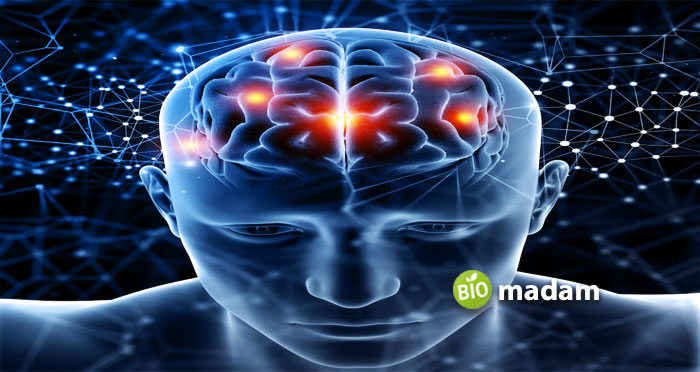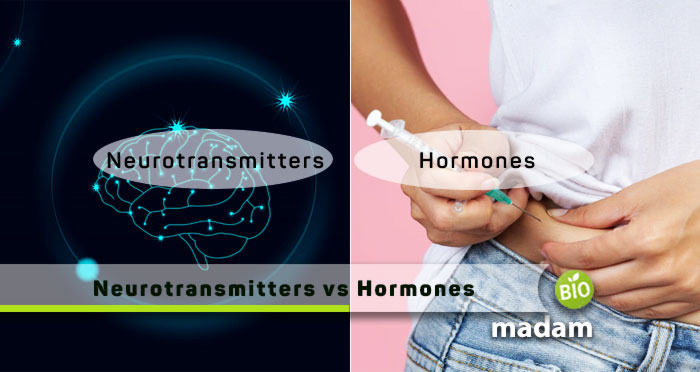Neurotransmitters and hormones are often confused and used interchangeably. While they both act as messengers in the body, they have specific roles. Neurotransmitters are brain chemicals from nervous system, whereas the endocrine glands, from the endocrine system, secrete hormones. Their mechanism of action is a major difference between neurotransmitters and hormones. They work differently to produce specific physiological actions in the body. Here’s a detailed description of neurotransmitters and hormones with the difference between the two.
Comparison Table
| Characteristic | Neurotransmitters | Hormones |
| Definition | Chemicals produced in the synaptic cleft | Body function regulating chemicals |
| Function | Action potential generation | Metabolism, mood, growth |
| Secretory Organs | Nervous system | Endocrine system |
| Target Site | Postsynaptic neuron | Target cells/organs |
| Transportation | Synaptic cleft | Bloodstream |
| Speed of Action | Fast | Slow |
| Examples | Dopamine, serotonin, epinephrine | LH, TSH, FSH, Vasopressin |
What are Neurotransmitters?
Neurotransmitters are chemicals present between two neurons that help exchange information between them. Neurons are the building blocks of the nervous system that are further classified as sensory, motor, or mixed neurons. One end of a neuron or nerve cell is called an axon, while the other is called a dendrite. The axon of the next neuron is present after the dendrite of the first. The space between the axon and the neuron contains neurotransmitters to help transmit signals. They are responsible for generating an action potential for a particular task. The messages travel through the neurons to produce the desired action. Neurotransmitters are an essential part of the peripheral nervous system as the process of communication depends on them. Fluctuations in the neurotransmitters can cause psychological diseases and affect your daily activities.
Types of Neurotransmitters
Neurotransmitters have various classifications, the most common of which are; excitatory and inhibitory. As the names suggest, excitatory neurotransmitters help produce an action potential. On the contrary, inhibitory neurons inhibit these activities. Let’s discuss them further.
Excitatory Neurotransmitters
Neurotransmitters like dopamine and epinephrine are excitatory neurotransmitters. They are overactive and stimulate the neurons to generate an action potential. It increases the trans-membrane ion flow. They are typically responsible for producing action.
Inhibitory Neurotransmitters
Inhibitory Neurotransmitters have the opposite function as excitatory Neurotransmitters. They help keep the body calm when needed. Inhibitory Neurotransmitters reduce the trans-membrane ion flow and halt the action potential production. Besides serotonin, dopamine also acts as an inhibitory neurotransmitter.

What are Hormones?
Hormones are regulatory substances released by the endocrine glands. The hormones go into the bloodstream, where they travel to the site of action. They translocate from the secretory glands to the target organs to produce an effect, for example insulin, ADH, aldosterone, norepinephrine, etc. They facilitate and regulate many functions within the body, like metabolism, mood, growth, and reproductive functions.
Types of Hormones
Different hormones are categorized into various types according to the type of gland, their function, and their chemical structure. The three main classes of hormones are; amine hormones, peptide hormones, and steroid hormones.
Amine Hormones
Amine hormones are also known as monoamine hormones. They have a single amino acid modified into a hormone by replacing a functional group. They are typically produced from amino acids named Tryptophan or Tyrosine. Examples of amine hormones include melatonin and norepinephrine.
Peptide Hormones
Peptide hormones comprise short chains of linked amino acids. They are primarily involved in controlling metabolism, appetite, and homeostasis. Peptides cannot pass the plasma membrane easily as they are lipophobic. They act by binding to the receptors that initiate second messengers. This process of signal induction amplifies the signals and facilitates action. Oxytocin, insulin, glucagon, and ADH are examples of peptide hormones.
Steroid Hormones
Unlike peptide hormones, steroid hormones are lipophilic. They can easily pass through the plasma or cell membrane. They bind to receptors in the nucleus or cytoplasm to form a complex. It binds to the DNA and enables gene expression. Examples of steroid hormones are progesterone, estrogen, and testosterone.

Similarities Between Neurotransmitters and Hormones
- They are both chemical substances.
- Neurotransmitters and hormones act as messengers.
- They bind to receptors to produce further action.
Differences Between Neurotransmitters and Hormones
Definition
Neurotransmitters
Neurotransmitters are chemical substances produced by the nervous system that facilitate actions.
Hormones
In contrast, hormones are chemicals secreted by the endocrine system to regulate bodily processes.
Functions
Neurotransmitters
Neurotransmitters are mainly involved in generating an action potential in the post-synaptic neuron.
Hormones
Conversely, hormones regulate bodily processes like metabolism, mood, reproduction, growth, etc.
Secretory Organ
Neurotransmitters
Neurotransmitters are a part of the nervous system, so it is the secretory organ.
Hormones
Alternatively, hormones are secreted by the endocrine system.
Target Site
Neurotransmitters
Neurotransmitters are transported through the synaptic cleft between two neurons.
Hormones
On the other hand, hormones are transported through the bloodstream to the target organ or cell. It is one of the fundamental differences between neurotransmitters and hormones.
Speed of Action
Neurotransmitters
Neurotransmitters act immediately to produce the desired action.
Hormones
However, hormones take time to travel to the action site and produce action.
Examples
Neurotransmitters
Examples of neurotransmitters include dopamine, serotonin, epinephrine, adrenaline, etc.
Hormones
Follicle-stimulating hormone, thyroid-stimulating hormone, progesterone, estrogen, insulin, and vasopressin are examples of hormones.
The Bottom Line
Neurotransmitters and hormones are chemical substances in the body acting as messengers. They regulate nerve action potential and body functions. The endocrine systems are connected to the nervous systems through these neurotransmitters and hormones. Neurotransmitters are in the synaptic cleft, and the latter transports to different organs to produce action. Hormones regulate functions like growth, mood, and metabolism. They include growth hormones, insulin, vasopressin, etc. Adrenaline, epinephrine, and dopamine are common neurotransmitters.
FAQs
Why are neurotransmitters not considered hormones?
Neurotransmitters are released into the synaptic cleft, whereas hormones are secreted into the bloodstream containing RBCs, WBCs, different proteins, etc. They travel to the target cell to produce action. Neurotransmitters generate an effect immediately.
How do hormones and neurotransmitters work together?
Hormones act on the brain to modify the production of gene products that are a part of neurotransmission. Thus, they may sometimes contribute to regulating the neurotransmitters in the body.
Which hormones are neurotransmitters?
Adrenaline is a neurotransmitter. Yet, it acts as a hormone as well. It triggers the fight-or-flight response, altering various body functions per need, like the contraction of blood vessels for increased blood supply to the heart.
Is dopamine a hormone or neurotransmitter?
Dopamine is a neurotransmitter released in the synaptic cleft. However, it may also act as a hormone. It plays a vital role in memory, pleasure, motivation, reward, and movement. High or low levels of dopamine can lead to neurological disorders.

Anna has completed her degree in Pharmacy from the University of Hawaii. She is serving as a research assistant in a pharmaceutical company. She had a great interest in writing blogs, traveling to different parts of the US, and trying delicious recipes in her spare time.

